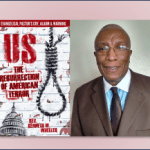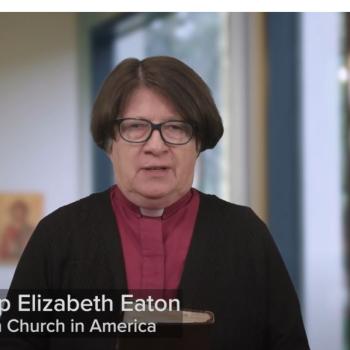Did you know that some churches and denomination will use a non-disclosure agreements (NDA) to silence clergy and congregants? Sometimes called “confidentiality agreements,” NDAs have been used in churches in the United States and abroad to silence victims of racism, sexual abuse, misogyny, homophobia, and other abuses.
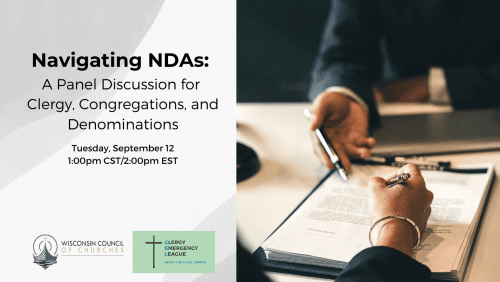
In fact, the Archbishop of Canterbury recently called for a ban on NDAs in the Church of England because they have been used as a tool to silence victims of racial abuse (https://www.bbc.com/news/uk-56817048.amp; https://julieroys.com/anglicans-oppose-ndas/).
NDAs silence clergy and congregations
In the Clergy Emergency League (CEL), an organization I co-founded in 2020, we have noticed a growing number of stories from clergy who have been silenced by their churches or denominations through NDAs.
One of the most notorious is the NDA that ELCA pastor Rev. Nelson Rabell-González refused to sign in 2021 when his church and denomination wanted to silence his prophetic voice. (Read: The NDA, the Church, and the Attempt to Silence Rev. Nelson Rabell-González).
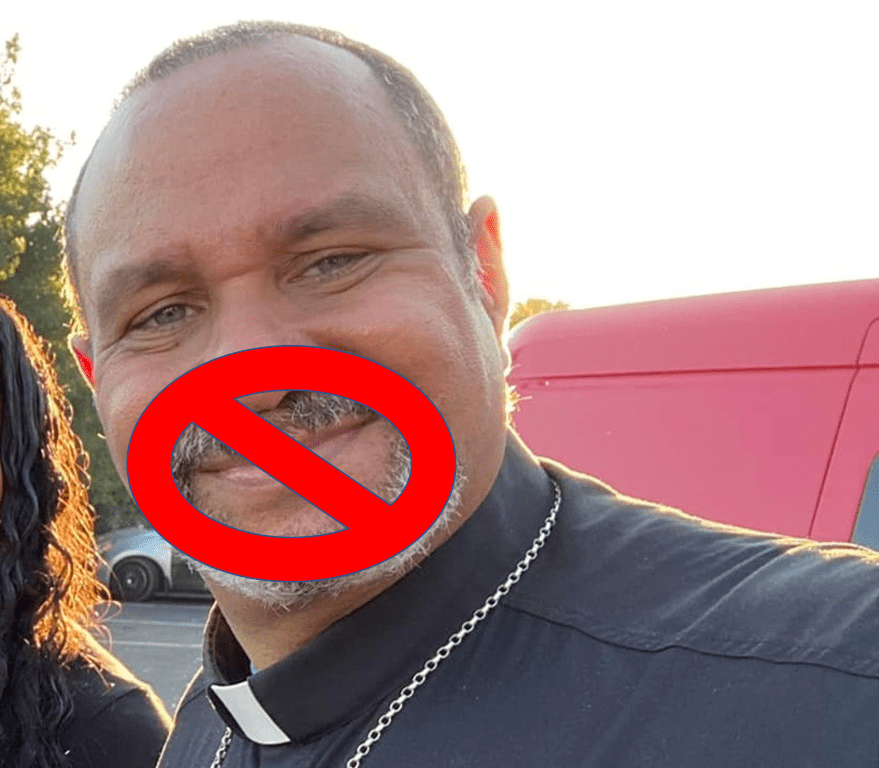
Rev. Rabell’s case is not unusual. Christianity Today recently reported that “a growing number of ministers, missionaries, Christian workers, abuse victims, and victims’ advocates are publicly objecting to the non-disclosure agreements and confidentiality clauses used by major religious organizations. They say the legal tools that were designed to protect tech industry ‘trade secrets’ are widely misused to conceal abuse, preserve secrets, and protect powerful reputations without regard for the human cost.”
And the human cost – as well as the cost to the church – is shouldered by individuals who are forced to shield the institutional church from scrutiny.
Navigating NDAs: A Panel Discussion for Clergy, Congregations, and Denominations
To help educate clergy, congregations, and denominations about the problems with NDAs in the church, CEL is joining with the Wisconsin Council of Churches to host a panel discussion on Tues., Sept. 12, 2 p.m. Eastern/1 p.m. Central. Register here: https://www.wichurches.org/2023/08/navigating-ndas-a-panel-discussion-for-clergy-congregations-and-denominations/
An NDA by any other name
NDAs go by many different names, so it can be tricky to figure out if one is actually being used. These agreements are variously called:
- non-disclosure agreement
- confidentiality agreement
- confidential disclosure agreement
- proprietary information agreement
- secrecy agreement
- non-disparagement agreement
No matter what they are called, this practice amounts to institutionalized secret-keeping. The keeping of secrets destroys the ability of clergy to do the ministry to which they are called and can destroy their reputations.
They can also destroy congregations. The existence of an NDA means a congregation can never talk about or address its history, so secrets continue to fester unchecked. Non-disclosure agreements, by whatever name, undermine the integrity of the church.
What are the origins of NDAs?
In the 1980s, as computer software became integral to a variety of products, employers began using the 19th century term, “intellectual property,” and sought to protect it through written agreements at the beginning or termination of employment. The goal was to get new hires to agree not to divulge intellectual property to their next employer. These are called “non-compete” clauses.
Companies also began writing severance agreements at the termination of employment in which the company would offer a severance package in exchange for the employee’s agreement not to divulge proprietary information.
Those early agreements opened the door to much more nefarious applications, however. Lawyers began using severance agreements to preclude employees from disclosing misconduct, sometimes against the employee and sometimes against others, through the use of “non-disparagement” clauses.
What is a “non-disparagement clause”?
The difference between “defamation” and “disparagement” is that defamation has only to do with making false accusations, whereas disparagement has to do with making any accusations at all – even if they’re true. A non-disparagement clause means that the employee must agree not to say anything negative about the company or its products services or leaders, in any form of communication. This often extends to their family members and can be in effect for generations.
We can’t know when severance agreements were first used to cover up misconduct, because the hallmark of such agreements is that the employee is precluded from even acknowledging that the agreement exists.
NDAs have been used to silence untold numbers of people harmed by corporations or powerful individuals.

For example, in my work with the anti-fracking movement, I knew of families who were forced to sign NDAs when their water was poisoned by drilling companies. If they wanted a settlement, they had to agree to not talk about what happened with anyone. Thus, the NDA enables a company to continue in its predatory behavior while the victims are left isolated, disconnected, and muzzled.
One of the most famous users and abusers of the NDA is former president Donald Trump.
He has forced many of his victims into silence through the threat of a lawsuit if they break the NDA they signed when they began volunteering or working for him. Again, if the victims can’t talk to each other and compare notes, they are easier to control, manipulate, and abuse. And the perpetrator can continue the misconduct with impunity.
But surely churches aren’t on par with Trump, are they?
Actually, churches have used NDAs to cover up misconduct. For example, in the Roman Catholic Church, dioceses have required survivors of pedophilia to sign NDAs as a condition of monetary settlements. Also, the Southern Baptist Convention used NDAs to silence victims of abuse. In an Episcopal church in California, an interim priest who uncovered embezzlement was pressured to sign an NDA as a condition of being reimbursed for expenses.
And in the ELCA, I am aware of at least two situations where clergy were pressured to sign them. One was for the termination of a pastor, and one was at the hiring of one. And both of these cases happened after the Churchwide Assembly voted in 2022 to limit the use of nondisclosure provisions.
But don’t churches need to protect confidentiality?
Yes, confidentiality and protecting privacy is important. But more often than not, the requirement to sign an NDA is really just a means by which to avoid transparency and accountability. This leads to toxic secrecy.
What’s the difference between confidentiality and secrecy?
Confidentiality is about ensuring a healthy system that respects privacy and boundaries. Confidentiality fosters confidence and trust and strengthens relationships through accountability.
In contrast, institutional secrecy is about hiding or concealing misconduct, abuse, discrimination, or anything that could potential embarrass the organization as a whole. Secrecy fosters fear, anxiety, mistrust, gossip, and dysfunction, and destroys accountability.
If you or someone in your congregation is being pressured to sign a “confidentiality agreement,” it may be a cover for institutional secret-keeping and a means by which to silence those who call out harmful behavior or otherwise criticize the church.
Educate yourself, your congregation, and your denomination about the harm caused by NDAs
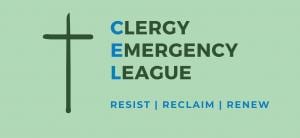
In the panel discussion on Sept. 12, we will talk with clergy who have fought against NDAs. We will feature Rev. Rabell as well as Rev. Stacey Grossman, an Episcopal priest in the San Francisco Bay area who has been involved in Safe Church work, including leading a revision of diocesan safe church standards and policies. She also served as the diocesan intake officer for clergy misconduct complaints.
Our special guest will be Ben Nicholson, co-founder of #NDAfree, a campaign with a vision to see individuals, Christian organizations, and local churches free from the misuse of Non-Disclosure Agreements.
In this important conversation, we’ll address these questions:
- What are appropriate — and inappropriate — uses of an NDA in a church?
- What should a pastor do if they are asked to sign a non-disclosure, non-disparagement, or confidentiality agreement?
- How can we support our colleagues who have been pressured into silence?
If you would like to learn more, or if you have questions about NDAs, we invite you to join this discussion.
Register here: https://www.wichurches.org/2023/08/navigating-ndas-a-panel-discussion-for-clergy-congregations-and-denominations/
Read also:
The Church’s Racist Code of Silence: One Pastor’s Story
#MeToo, #ChurchToo: The Church is Facing the Truth About Its Sexism
From a Moment to a Movement: Rev. Nelson Rabell’s Saga and the ELCA Churchwide Assembly

The Rev. Dr. Leah D. Schade is the Associate Professor of Preaching and Worship at Lexington Theological Seminary in Kentucky and ordained in the ELCA. Dr. Schade does not speak for LTS or the ELCA; her opinions are her own. She is the author of Preaching in the Purple Zone: Ministry in the Red-Blue Divide (Rowman & Littlefield, 2019) and Creation-Crisis Preaching: Ecology, Theology, and the Pulpit (Chalice Press, 2015). She is the co-editor of Rooted and Rising: Voices of Courage in a Time of Climate Crisis (Rowman & Littlefield, 2019). Her newest book is Introduction to Preaching: Scripture, Theology, and Sermon Preparation, co-authored with Jerry L. Sumney and Emily Askew (Rowman & Littlefield, 2023).


